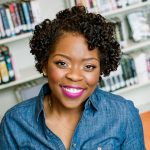 Assistant Professor of Communication Shardé Davis is the 2018-19 recipient of the American Fellowship for Postdoctoral Research Leave awarded by the American Association for University Women (AAUW). The primary purpose of the Postdoctoral Research Leave Fellowship is to increase the number of women in tenure-track faculty positions and to promote equality for women in higher education. This fellowship is designed to assist the candidate in obtaining tenure and further promotions by enabling her to spend a year pursuing independent research.
Assistant Professor of Communication Shardé Davis is the 2018-19 recipient of the American Fellowship for Postdoctoral Research Leave awarded by the American Association for University Women (AAUW). The primary purpose of the Postdoctoral Research Leave Fellowship is to increase the number of women in tenure-track faculty positions and to promote equality for women in higher education. This fellowship is designed to assist the candidate in obtaining tenure and further promotions by enabling her to spend a year pursuing independent research.
People of Color & Interpersonal Communication
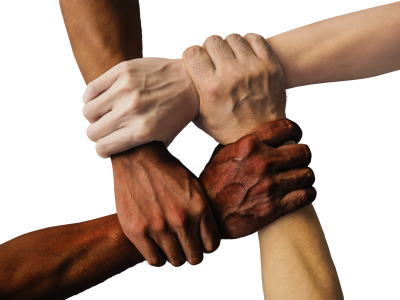 As the Spring 2018 semester began, Communication students were buzzing about the new courses that had been added to the course catalog. One of the new courses, People of Color and Interpersonal Communication (COMM 4222) taught by Professor Shardè Davis, has been particularly popular amongst students.
As the Spring 2018 semester began, Communication students were buzzing about the new courses that had been added to the course catalog. One of the new courses, People of Color and Interpersonal Communication (COMM 4222) taught by Professor Shardè Davis, has been particularly popular amongst students.
The objectives of this course are to observe the impact of race, ethnicity, and culture on interpersonal interactions and survey key theories and empirical works of past and current race relations in the U.S., negotiation of identity, and ways identity is communicated in various personal relationships. Professor Davis teaches students about the communication theories that may be relevant to many people of color that are not thoroughly covered in any other course within the university.
Students learn through many different personal experiences throughout the course. For example, students complete a project where they observe race relations in a public place on campus, and they also partake in a privilege walk to understand the different intersecting forms of identity and oppression. Students are able to gain knowledge from one another through this experiential method of learning. The classroom cultivates meaningful and productive conversation about the relations between communication and race.
Professor Davis hopes that students are able to learn theories and language that will help them understand the experiences that they go through in their lives. This class builds upon the interpersonal communication courses that students have already taken while intertwining aspects of diversity in communication. People never stop communicating, and this course teaches students how to communicate more effectively with a more diverse population.
Professor Davis stressed the importance of keeping the course relevant. Race relations in America and the world are always changing, and because of that, so will class discussions and projects. She emphasized the need to make the class relevant to the world around us and the experiences that her students are going through.
Students are thrilled to have a course like this at the university, and many of them can’t stop talking about their experiences with the course. A current student stated, “I like this course because I’m able to hear different perspectives on life and how their experiences shaped those perspectives. I would describe the class as a place where a group of students are able to have meaningful and insightful conversations about topics that our society has deemed as taboo. Dr. Davis is a great professor that has taught me valuable life lessons that I can use outside the classroom to be not only a better member of society but more importantly, a better person overall”.
The course will be offered online in the Summer of 2018 for any interested students. For any questions about the course or Dr. Davis’ research, you can email her at sharde.davis@uconn.edu
From the Court to Class – WBB Player Kia Nurse’s Senior Thesis
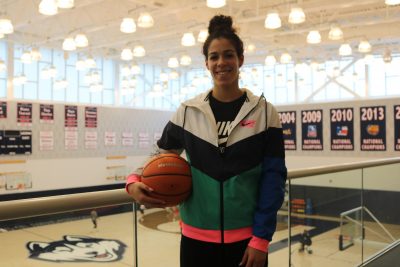 Senior Communication student and UConn Women’s Basketball player Kia Nurse is finishing up her collaboration with East Hartford Middle School for her thesis about young female athletes. Despite her busy practice schedule, Kia has been meeting with a group of students from East Hartford Middle School to work on their communication, leadership and teamwork skills.
Senior Communication student and UConn Women’s Basketball player Kia Nurse is finishing up her collaboration with East Hartford Middle School for her thesis about young female athletes. Despite her busy practice schedule, Kia has been meeting with a group of students from East Hartford Middle School to work on their communication, leadership and teamwork skills.
Kia’s goal for the project was to create a program where young female athletes could understand the benefits of sports other than just winning and losing. “A lot of research shows girls quit sports once they get to high school, they lose confidence in it, it’s not cool anymore, but there’s so many benefits. The team work, the communication, the discipline that you learn through it. That’s why you have to keep playing” stated Kia.
She has enjoyed her time working with these students and she plans on continuing to stay a part of their lives in the future. She hopes that her students learn that, “there’s always going to be someone in the world that’s bigger, faster, stronger, more talented than you. But if you can always work hard in everything that life puts in front of you, it’s noticed more”.
COMM Society’s 5th Annual Public Speaking Competition
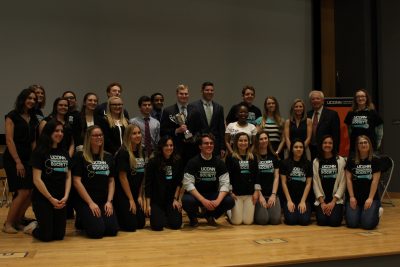 Every year for the past 5 years, the Communication Society has hosted their Annual Public Speaking Competition. Students from all majors and backgrounds audition to win the title of “UConn’s Best Public Speaker”. The 2018 competition is just around the corner, taking place on the evening of April 9th.
Every year for the past 5 years, the Communication Society has hosted their Annual Public Speaking Competition. Students from all majors and backgrounds audition to win the title of “UConn’s Best Public Speaker”. The 2018 competition is just around the corner, taking place on the evening of April 9th.
“The competition is a way for UConn students to have a strong opinion or idea, and be able to express it while providing evidence to support their opinion” says Public Speaking Competition Chair Jessica Devitto. Students will be suiting up and practicing their public speaking techniques that they’ve learned throughout their time as an undergraduate student. The contest features 5 excited students that will be judged by three esteemed judges. The judges this year are the Comm Department’s Professor Amanda Denes, WFSB-TV and Connecticut’s CBS affiliate Caitlin Nuclo, and NBC Connecticut’s political reporter Max Reiss.
Year after year, the COMM Society searches for participants with “previous public speaking experience, charisma and an overall confidence that will light up the stage” says Devitto. Any undergraduate student is welcome to audition, which diversifies the participants and brings interesting perspectives to the event. This year’s topic is “What impact is social media having on our personal relationships?”. Each contestant will have the opportunity to speak out about whether or not they feel social media is having a positive or negative influence on people’s personal relationships through multiple rounds.
The competition is composed of 3 different rounds. The first round consists of prepared speaking, where each contestant will deliver their take on the subject in under 5 minutes. During the second round, contestants will be asked a short question by the judges based on their first speech, and they will have 2 minutes to give a response to the question. In the third and final round, contestants will be presented with an impromptu topic by the host, and the contestants will be given 15 minutes to formulate their 4 minute response. At the end of the third round, the judges will award one contestant as UConn’s best public speaker, and they will distribute $400 in awards.
Devitto stated, “This event is heavily anticipated by the members of the Communication Society because we get to see their months of hard work pay off. We also love attending because it is a way to gather the COMM community together to recognize accomplishments while building friendships”. Along with the rest of the Communication Society, Devitto has spent months working to make the event run smoothly.
Overall the COMM Society sees this as an opportunity for students to have their thoughts and ideas heard by people of different ages, races, and genders. It allows for contestants to get joy out of knowing they did something they might never have thought about doing before. As the competition rapidly approaches, we’re looking forward to being blown away by the contestants for the 5th year in a row, and we hope to see many familiar faces in the crowd.
Event details:
Monday April 9, 6-8pm, Student Union Theater
Questions? Contact Jessica Devitto at jessica.devitto@uconn.edu
Women Making History at UConn
The month of March is very special to the Department of Communication because it is Women’s History Month. We are lucky to have so many women faculty members that are constantly innovating the field of Communications and making history. Some of these amazing women have compiled words of wisdom to share with other women who are looking to be history makers themselves.
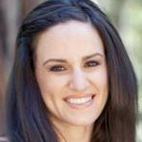 Amanda Denes Ph.D.– AAmanda Denes is an Associate Professor and the Director of Graduate Studies in the Department of Communication. Her research focuses on communication in various types of interpersonal relationships such as romantic relationships, parent-child relationships, and friendships.
Amanda Denes Ph.D.– AAmanda Denes is an Associate Professor and the Director of Graduate Studies in the Department of Communication. Her research focuses on communication in various types of interpersonal relationships such as romantic relationships, parent-child relationships, and friendships.
“One piece of advice is to make sure you find time to take care of yourself. There are so many struggles that women face on a daily basis that can be emotionally and mentally draining, so looking out for our own mental health and well-being is pivotal. There is sometimes stigma around mental health issues, but it’s so important for women to have an outlet and place to discuss struggles. Part of our gendered society is that women are often taxed with managing other people’s problems, fixing everything for everyone, doing the unpaid emotional labor, etc… it’s important to take time for yourself, whether that be finding a great therapist, practicing yoga or meditation, going on a run, or taking time for any other forms of self-care. For me, part of this also means having a great network of female friends. I am so fortunate to have amazing women in my life that help provide support and empowerment–they have helped me through so many challenges and the ups and downs of building a career. Whatever way you choose, make sure to take time for yourself and to not feel guilty about engaging in self-care.”
 Shardè Davis Ph.D.– Dr. Shardé M. Davis is an Assistant Professor in the Department of Communication and a faculty affiliate of the Africana Studies Institute and the Institute for Collaboration on Health, Intervention, and Policy (InCHIP) at UConn. Her research explores how Black women’s complex identities—and the power-laden social structures that shape them—influence the way they communicate with close others.
Shardè Davis Ph.D.– Dr. Shardé M. Davis is an Assistant Professor in the Department of Communication and a faculty affiliate of the Africana Studies Institute and the Institute for Collaboration on Health, Intervention, and Policy (InCHIP) at UConn. Her research explores how Black women’s complex identities—and the power-laden social structures that shape them—influence the way they communicate with close others.
“My advice to other women is to give yourself some grace. U.S. Society has a way of making women (especially women of color) feel like we aren’t doing enough. We fall victim to the superwoman archetype and push ourselves beyond our physical, mental, and psychological capacities to be our “best self” in every situation and in the company of others. This lifestyle is not sustainable and research shows that it corresponds to maladaptive health outcomes. We need to tell ourselves that if we are trying our best then that is enough! Don’t compare yourself to other people, namely folks who have gender, racial, class, and other institutional privilege over you. It’s not a fair comparison and we will fall short every time. Focus your energy on being your best self based upon your own (reasonable) standard of excellence. We also need to listen to our bodies and take a break when we experience exhaustion and take a moment to respect our emotional process and expression. I study these topics for a living, yet I struggle to adhere to my own advice at times. So please know that our womanhood is an ever-evolving journey.”
 Anne Oeldorf-Hirsch Ph.D.– Anne Oeldorf-Hirsch is an Assistant Professor in the Department of Communication at University of Connecticut, where she conducts research in the Human-Computer Interaction lab. Her research interest is on the benefits of social media in terms of learning new information, civic engagement, and well-being.
Anne Oeldorf-Hirsch Ph.D.– Anne Oeldorf-Hirsch is an Assistant Professor in the Department of Communication at University of Connecticut, where she conducts research in the Human-Computer Interaction lab. Her research interest is on the benefits of social media in terms of learning new information, civic engagement, and well-being.
“Be honest with yourself about what you really want. Society puts strong pressure on all of us about what we should be striving for, and the pressure is even stronger for women. We have been put into prescribed paths for most of history about what it means to be a woman, what we should expect out of life, and what is expected of us. Expect things for yourself, and work to fulfill your true needs and desires.”
COMM Student Feature – Sahara Shrestha
 The Department of Communication is continuously impressed by the amount of work and commitment our students take to further their education and careers. There are many students that go above and beyond their class assignments to make themselves the best communication professionals they can be. Senior communication major Sahara Shrestha is a prime example of an outstanding student in the department.
The Department of Communication is continuously impressed by the amount of work and commitment our students take to further their education and careers. There are many students that go above and beyond their class assignments to make themselves the best communication professionals they can be. Senior communication major Sahara Shrestha is a prime example of an outstanding student in the department.
Sahara originally entered UConn as a Biology major, but quickly changed after she realized that her people skills would be best used elsewhere. She has a strong passion for the entertainment industry and she aspires to spend her career collaborating with people, so she knew communication was the perfect major for her.
Through her love of communication, she decided to become the co-founder of the UConn Chapter of Spoon University in January of 2016. Spoon University is an online journalism website about food. The writers feature new restaurants, health trends, and anything related to food. Sahara later became the President, as well as the Marketing Director for the chapter. Her role as the Marketing Director makes her the voice of the chapter and allows her to maintain the chapter’s reputation through social media and planning fundraisers. This opportunity has been an incredible collaboration of passions. She is a self proclaimed foodie, and getting an opportunity to use food to further her career was everything she could have hoped for.
Her experience with Spoon University has given her a lot of insight as to what career path she wants to take post graduation. She noted that she would love to continue working with SpoonU Headquarters, but she has dreams of working in the entertainment industry. Her experiences at UConn and in her positions have paved the way for her to continue working in marketing, and fulfill her dream of one day become a communication professional in New York City.
Sahara has truly found her place within the Department of Communication. She stated that her favorite course over her four years has been COMM 2940. She found the course to be incredibly helpful and felt that it was the most hands-on Comm class that she has taken. Sahara loved being able to physically create something and found digital production to be a very interesting topic. Over her four years, Sahara has created a strong connection with current Graduate Teaching Assistant Ambyre Ponivas. She has taken multiple classes with her, and found that she teaches class in a way that makes students interested and invested in their studies.
Whether it be her involvement with Spoon University, or in her studies, Sahara is well-rounded student that the Department of Communication is lucky to have as part of our program. Sahara constantly follows her passions, and we’re lucky her passions have led her to UConn!
If you’re interested in joining the UConn chapter of Spoon University, email Sahara at sahara.shrestha@uconn.edu.
COMM Department Student Projects Fall 2017
In the fall of 2017, students in Communications courses devoted their semesters to creating projects, films, and photo essays that the Department of Communication is proud to present. Featured below are projects from students of The Process of Communication (COMM 1000), Fundamentals of Digital Production (COMM 2940), and Persuasion (COMM 3100).
The Process of Communication
A course taught by Professor Stephen Stifano
COMM 1000- A study of modern communication theories and principles where students understand how people affect and are affected by others through communication.
This short film expresses the importance of equality for all people.
Fundamentals of Digital Production
A course taught by Professor Stephen Stifano and Adam Rainear
COMM 2940- Students develop fundamentals associated with the production of digital video, audio, and images to communicate with various audiences by rotating through various roles of pre-production, production, and post-production processes in the creation of multimedia projects.
This film shows a couple’s journey into making their house a home.
This sci-fi short film about a woman trapped in her own home is a must-watch thriller.
Persuasion
A course taught by Thomas Meade, Kimberly Embacher, and Matthew Morse
COMM 3100- Students are introduced to theories of attitude formation, change and reinforcement. Research is used to evaluate past and present models of persuasion through the creation of their own social campaign.
https://nicoleevans8.wixsite.com/uconnshot
UConn Shot was a campaign designed to promote the free flu shot services that are on and around campus.
https://uconnsoberides.weebly.com/
UConn Sober Rides is a student campaign that connected UConn students with sober drivers to reduce the amount of drunk driving.
Like these videos? Follow us on social media to keep up with the latest details about this semester’s Digital Projects Screening taking place later on in the semester.
2018 CSCH Encore Grant Recipient Rory McGloin
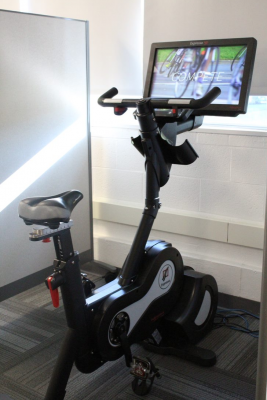 After a lot of hard work on proposals, Professor Rory McGloin was awarded with the Collaboratory on School and Child Health 2018 Encore Grant for his latest project, “Gearing up! Using Exergaming to Impact Health in Overweight Children”. Professor McGloin along with Department of Kinesiology and Department of Educational Psychology’s Jaci VanHeest will be conducting research on Children and their attitudes towards exercise.
After a lot of hard work on proposals, Professor Rory McGloin was awarded with the Collaboratory on School and Child Health 2018 Encore Grant for his latest project, “Gearing up! Using Exergaming to Impact Health in Overweight Children”. Professor McGloin along with Department of Kinesiology and Department of Educational Psychology’s Jaci VanHeest will be conducting research on Children and their attitudes towards exercise.
McGloin and VanHeest will be conducting a 10 week study where they will give children in schools access to exergaming bikes to see if it will increase their physical activity throughout the course of the study, as well as an increase in self-efficacy towards physical fitness. McGloin hypothesizes that exergames will help engage students in a unique way because it mimics the immersiveness of a video game.
McGloin and VanHeest plan on using the grant to purchase an exergaming bike which will be used to set up a remote lab location in a local school system. Students will receive Amazon gift cards for participating to encourage the continuation of participation. McGloin also stated that part of the grant will be set aside to hire a motivated and responsible student to assist in running the lab.
Professor McGloin deems this research important because obesity continues to be a major issue in society, and the cause for concern increases as time spent engaging in physical activity is diminishing. In the school systems, technology is displacing time spent being active at an alarming rate. The researchers believe that doing this long-term intervention will allow them to see how they can respond to the novelty of the device, and if it has a future within school programs.
When asked about his interest in the research, McGloin stated that it’s important to determine the effects of these new technologies and many of the opportunities that they may or may not provide to users. He finds it very rewarding to work on research that can ultimately improve someone’s lifestyle and make a difference in their lives. This study is a great way to get people to ask themselves about the effects media has on them.
The study will be taking place over the course of the next year. After the study, the researchers hope to present their findings with members of the local community to raise awareness for children who are obese, or at risk, and may need help achieving their daily activity goals.
Martin Horn Scholarship Recipient Meghan O’Neil
T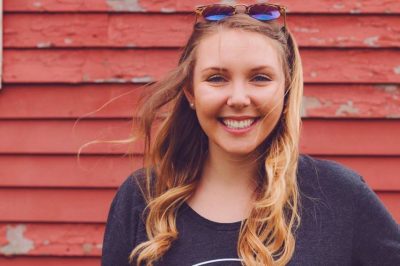 he Department of Communication annually selects one outstanding undergraduate student to be awarded with the Martin Horn Scholarship. Since achieving great success in marketing communications, alumnus Martin Horn has made several generous donations to the UConn Department of Communication, from which the scholarship is awarded. The 2017-2018 recipient is Meghan O’Niel.
he Department of Communication annually selects one outstanding undergraduate student to be awarded with the Martin Horn Scholarship. Since achieving great success in marketing communications, alumnus Martin Horn has made several generous donations to the UConn Department of Communication, from which the scholarship is awarded. The 2017-2018 recipient is Meghan O’Niel.
Meghan is a Senior at the University. She is double majoring in Sociology and Communication with a minor in Women’s Gender and Sexuality Studies (WGSS). She originally entered UConn as a sociology major, but after taking The Process of Communication (COMM 1000) as a sophomore, Professor Stifano and Graduate Assistant Kimberly Embacher inspired her to pursue a degree in communication. She found communications to be an interesting field to venture in to because it’s valuable to many sectors in her personal and professional life.
Through her undergraduate courses she learned what it takes to be a communications professional. Meghan is currently the UConn Club Sports Social Media Coordinator. This being her first position in the field of communication, it is a great learning experience for her and it’s allowing her to apply the skills that she’s learned thus far to this job.
After she graduates, she plans on continuing her education by attending graduate school. She has applied to multiple programs in the U.K., and has already been accepted to one. She’s incredibly passionate about gender equality and is looking to pursue a Masters Degree in an area related to WGSS.
This scholarship has already helped Meghan pursue her career goals. Not only did receiving this award give her the extra boost of confidence that she needed, it also allowed her to be able to afford to apply to all of the schools that she was interested in.
In her time at UConn she has found that knowing how to communicate with others is an invaluable skill across all areas of life. Professionally she feels more confident when working in teams because of her undergraduate courses. She has also found that being a Communication major has prepared her for career opportunities in many different sectors, which gives her confidence knowing that she has freedom to find a career that she will love.
UConn’s Day of Metanoia
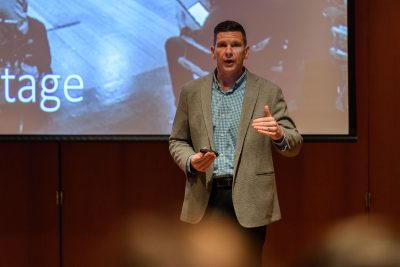
To continue the tradition of metanoia, the UConn Community declared Wednesday, November 8th as a day of “reflection, learning, sharing, and transformation focused on confronting racism in our university, our state, and our nation”. Recent events such as Charlottesville have brought to light the racism, anti-semitism, islamophobia, nativism, and colonialism that still exists in America. As the University recognizes this, the Department of Communication would like to contribute insight on the role of communication in battling racism.
Communication Professor Shardé Davis explains the importance of this day of metanoia as an open space where people can talk and learn about the topic at hand. Susan Herbst stated that, “racism is not a problem to be solved, but a fundamental part of our history and contemporary society for which we must take responsibility”. Professor Davis exclaimed that it becomes problematic when people deem our society as a post-racial society, and act as if racism doesn’t exist. The Metanoia events gave many opportunities to students, faculty and staff to call attention to an issue in order to agree upon its existence.
Professors Rory McGloin and John Christensen held a seminar to discuss racial stereotypes in sitcoms. The seminar created an open discussion about the way that minorities are portrayed in media and the effects of the stereotypes that are present. Media makes up a large portion of the field of communication. This seminar allowed for students, faculty members, and community members to call to action the need for change in the industry and ways that change could occur.
There are many different ways to communicate about racism, but below are a few examples that Professor Davis suggested as the campus combats racism even after the designated day of metanoia.
Thinking before you speak- Often times when people use racial microaggressions or stereotypes, it’s because they don’t fully think about their words before they say them. In order to prevent this from happening, evaluate what you’re going to say before you say it.
Active Listening- When talking about issues such as racism, many people are so set on their own views that they speak more than they listen. Active listening is important because it allows people to understand other perspectives and it opens up opportunity for people to learn more about the subject.
Be open to learning- If people are open to learning, they also open themselves up to change. If people take it upon themselves to learn about racism by searching for sources to learn more about it, such as on campus cultural centers, they open themselves up to opportunities to grow and educate themselves and others on ways to combat racism.
The Department of Communication embraces diversity, and its members constantly devote themselves to combating prejudice. The day of metanoia was a fantastic opportunity for people to come together and speak about such an important topic, but we encourage you to battle racism every day of the year.